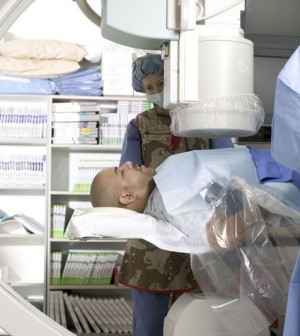- Could Your Grocery Store Meat Be Causing Recurring UTIs?
- Are You Making This Expensive Thermostat Error This Winter?
- Recognizing the Signs of Hypothyroidism
- 10 Strategies to Overcome Insomnia
- Could Artificial Sweeteners Be Aging the Brain Faster?
- Techniques for Soothing Your Nervous System
- Does the Water in Your House Smell Funny? Here’s Why
- Can a Daily Dose of Apple Cider Vinegar Actually Aid Weight Loss?
- 6 Health Beverages That Can Actually Spike Your Blood Sugar
- Treatment Options for Social Anxiety Disorder
Health Risks Higher for LGBT Community

In yet another sign that lesbian, gay and bisexual people face additional health risks, a new study finds they’re more likely to drink heavily and smoke.
Gay men and bisexuals of both genders are also more likely to report moderate-to-severe “psychological distress,” and lesbians have a higher risk of poor or fair health than other women, the researchers reported.
The study, which mirrors the findings of earlier research, doesn’t determine why gay, lesbian and bisexual people face these higher health risks.
However, the study authors suggested that discrimination causes stress and could be a contributing factor.
“Stigma and discrimination against the LGBT population can lead to lower levels of self-esteem and cause feelings of shame and rejection,” explained study author Gilbert Gonzales. He is an assistant professor with Vanderbilt University School of Medicine, in Nashville.
In the study, the researchers examined the results of the 2013 and 2014 National Health Interview Surveys. Both surveys were the first to include questions about sexual orientation. The research team focused on the survey results of 525 lesbians, 624 gay men and 515 bisexuals and compared them to those of 67,150 heterosexual people. All participants were adults.
A few of the top findings:
- Forty percent of bisexual men were considered to have moderate to severe psychological distress, compared to 25.9 percent of gay men and 16.9 percent of straight men. Forty-six percent of bisexual women had psychological distress compared to 28.4 percent of lesbians and 21.9 percent of straight women.
- “We were surprised to find that bisexual adults were so much more likely to report psychological distress compared to their gay and straight counterparts,” Gonzales said. It’s possible, he added, that they suffer from both anti-gay discrimination from the wider society and anti-bisexual discrimination within the gay community.
- There was a big gap in moderate smoking among gay men (19 percent) and straight men (13 percent). And there was a gap in moderate smoking among lesbians (20 percent) and bisexual women (22 percent), compared to straight women (11 percent). The study defined heavy smokers as those who smoked at least a pack a day and moderate smokers as those who smoked less.
- The study defined heavy drinkers as those who drank more than 14 drinks a week (men) or 7 a week (women). There was a big gap between bisexual men (11 percent were heavy drinkers) compared to straight and gay men (5 percent to 6 percent). Twelve percent of bisexual women were heavy drinkers compared to 9 percent of lesbians and 5 percent of straight women.
- Bisexual men and lesbians were most likely to report their health as poor or fair instead of excellent, very good or good.
The researchers found that gaps remained even after they adjusted their statistics so they wouldn’t be thrown off by factors like high or low numbers of survey respondents who shared factors like age, education level and ethnicity.
What’s going on?
Brian Mustanski, an associate professor at Northwestern University Feinberg School of Medicine in Chicago who studies LGBT issues, said stigma does indeed appear to play a role. His research has linked intense bullying of young LGBT people to higher rates of depression.
Susan Cochran, a professor of epidemiology at the University of California, Los Angeles, who studies sexual orientation and health, said the findings aren’t new. She also cautioned that a greater risk of substance abuse and health problems isn’t a guarantee that a person will suffer from them. “Being gay, lesbian or bisexual doesn’t necessarily lead to this,” she said.
In addition, factors beyond sexual orientation may play a role, she added. “For example, women who work are more likely to drink and white women are more likely to drink, but women raising small children are less likely to drink. So lesbians — who are more likely to work, be white and not raising kids — drink more,” she said.
Researchers can try to adjust their findings so they won’t be thrown off by factors like this, Cochran said. But others are impossible to capture, she added, such as differences in straight and lesbian cultures regarding the acceptability of drinking in bars.
The study was published online June 27 in Annals of Internal Medicine to coincide with its presentation at AcademyHealth’s annual research meeting, in Boston.
More information
For more about LGBT health, try healthypeople.gov.
Source: HealthDay
Copyright © 2026 HealthDay. All rights reserved.










